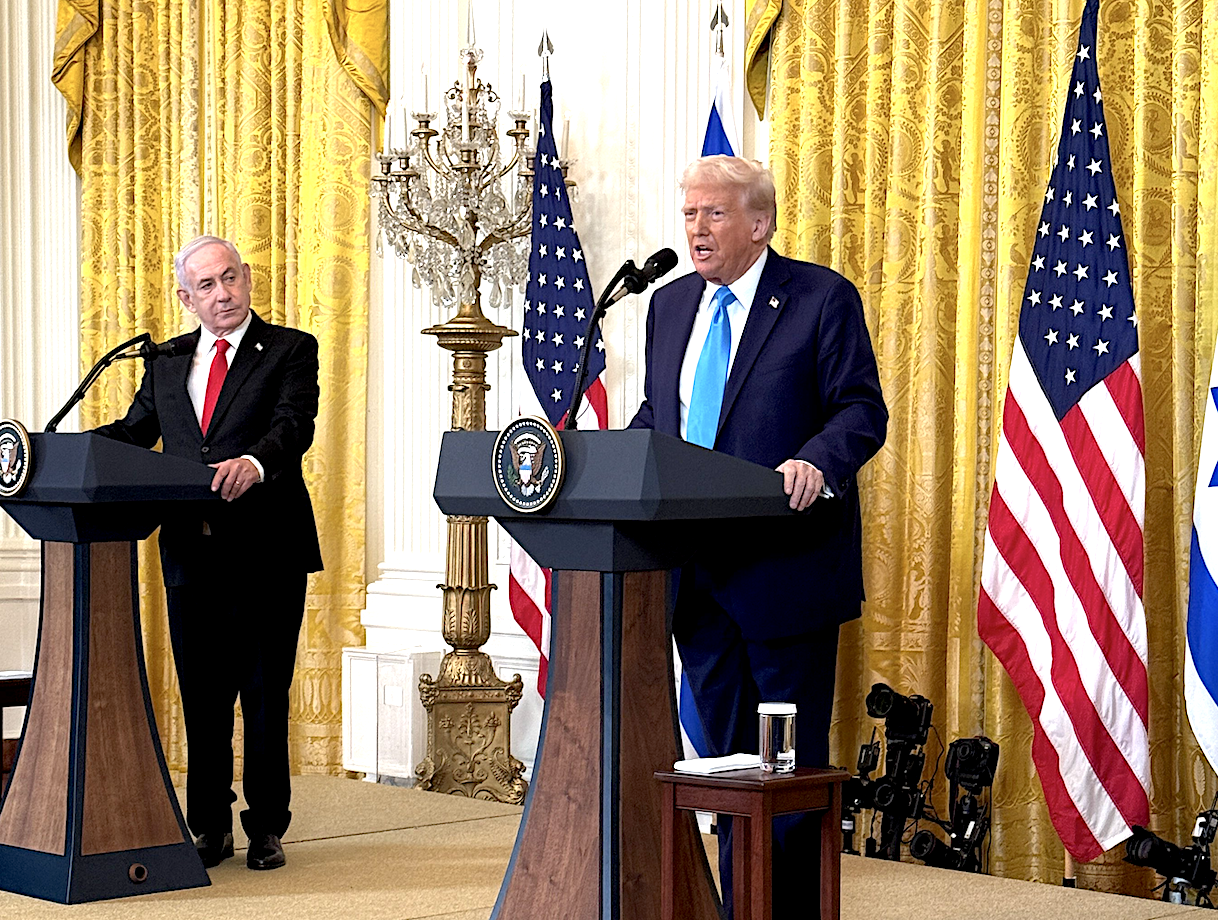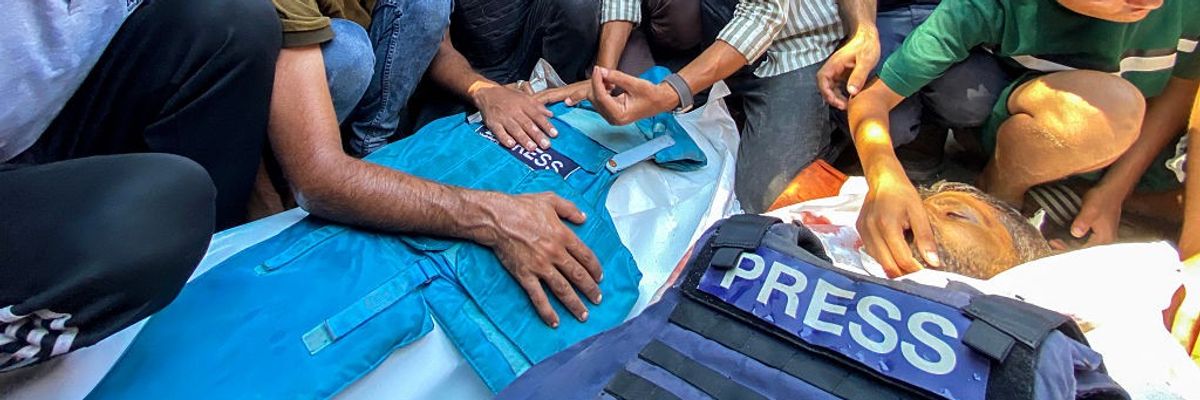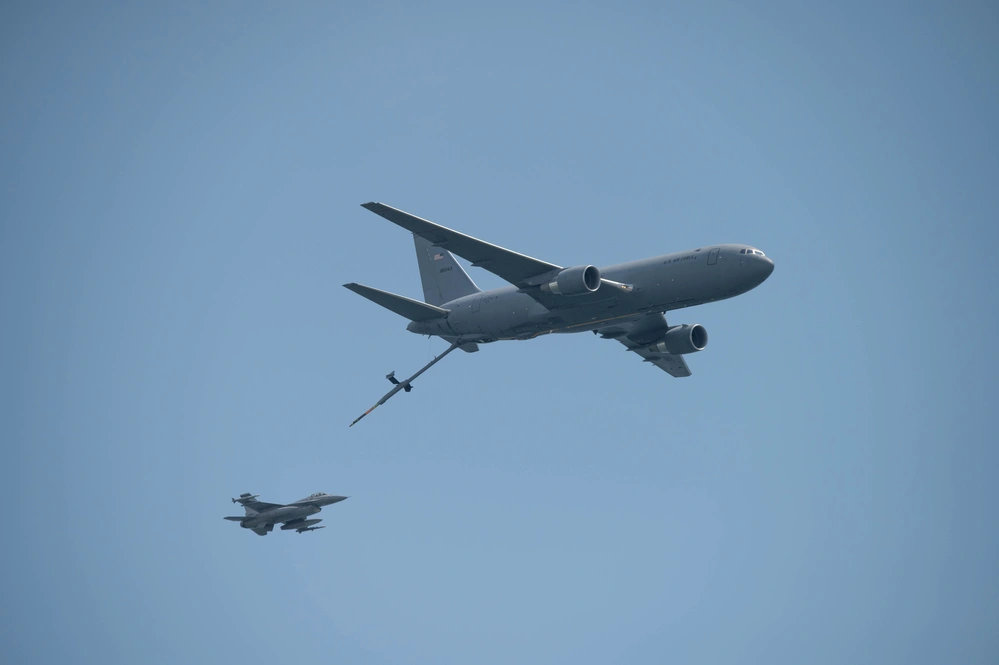First published by Middle East Eye
Israel’s justification for the mass slaughter of Gaza’s people and
their starvation – now officially confirmed as a famine engineered by
Israel – was built on a parade of easily discredited lies from the
start: of beheaded infants, of babies in ovens, of mass rape.
It should surprise no one that Israel
continued advancing similarly outrageous lies as it set about – as all
genocidal regimes must do – dismantling the most basic infrastructure of
survival for Gaza’s population.
It cut off humanitarian aid delivered by the United Nations agency
Unrwa, and destroyed the enclave’s hospitals, while killing, jailing and
torturing its medical personnel.
Israel claimed it had documents proving the UN was a front for Hamas – documents
it never produced. Meanwhile, all 36 of Gaza’s hospitals have been
attacked – attacks whose implicit rationale was that they were built
atop Hamas “command and control centres”, though those centres have
never been found.
Expanding this narrative, Israel rounded up
and jailed the enclave’s leading doctors, who had been working round
the clock to treat the endless tide of maimed men, women and children,
as supposed “Hamas operatives” in disguise.
Also as any genocidal regime must do – especially one that wishes to
uphold the pretence that it is a democracy with the world’s “most moral
army” – Israel laboured tirelessly to cast a pall of darkness over its
atrocities.
It blocked western journalists from accessing Gaza, and then picked off Palestinian journalists
in the enclave one by one, until more than 200 had been assassinated,
11 in the past couple of weeks alone, including contributors to Middle
East Eye and Al Jazeera. Others have been forced to flee to safety abroad.
The western press corps, which barely raised a peep about its
exclusion for most of the past 22 months of genocide, collectively
shrugged its shoulders as its colleagues in Gaza were slowly
exterminated. Nothing to see here.
That was until this month, when Israel celebrated an air strike that killed six Palestinian journalists, including the entire five-person team covering Gaza City for Al Jazeera.
The strike’s timing was extremely fortuitous. Israel is calling up 60,000 troops
for a last push into the remains of Gaza City, where around one million
Palestinians – half of them children – are holed up, being starved to
death.
Those civilians will either be killed or rounded up into a concentration camp Israel is calling a “humanitarian city”, close to the border with Egypt. There, they will await their ultimate expulsion – possibly to South Sudan, a failed state where Israel provided the arms that fuelled civil war and violence.
Campaign of vilification
Israel justified its murder of Al Jazeera’s crew on the grounds that
one among them, Anas al-Sharif, a Pulitzer Prize-winning reporter, was
secretly a “Hamas terrorist”.
The claim was no less preposterous than the excuses Israel has been
using to rationalise its exclusion of aid workers, and its killing and
jailing of hundreds of Gaza’s medical staff.
Gaza’s doctors – overwhelmed every day for nearly two years with
numbers of dead and wounded more normally associated with major natural
disasters, and in conditions where they are denied basic medicines and
equipment – supposedly had enough time on their hands to spend it
colluding with Hamas fighters. Or so Israel would have us believe.
Sharif, we are told, similarly found time between breaks from his 22-month, frantic reporting schedule – much of it on camera – to serve as a Hamas commander “directing rocket attacks on Israeli civilians”.
Presumably, he had superhuman powers that meant he could survive on
no sleep for two years and, like a quantum particle, be in two different
places at the same time.
We now know exactly where this ridiculous story originated: from
something Israel calls its “Legitimisation Cell”. The intelligence
unit’s name, which was surely never supposed to come to light, is the
give-away. Its job has been to legitimise Israel’s atrocities with
stories vilifying its victims and thereby making the genocide more palatable to Israeli and western audiences.
The Israeli news website +972 exposed
the cell within days of Sharif’s killing this month, reporting that it
was formed after 7 October 2023 – the day Hamas and other groups broke
out of their Gaza prison camp, spreading carnage, following 17 years of a
brutal siege.
The Legitimisation Cell’s central purpose has been to help Israel
plant stories in the western media portraying Gaza’s hospitals as
hotbeds of terrorism, and its journalists as “undercover Hamas
operatives”.
Fabricated evidence
Drawing on three Israeli intelligence sources, +972 reported that
Israel’s motive in creating the Legtimisation Cell was not
security-related, but driven purely by propaganda needs – or what is
known in Israel as “hasbara”.
The cell was reportedly desperate to find a link – any link – between
a handful of journalists in Gaza and Hamas, in order to sow doubt in
the minds of western audiences, to justify killing the enclave’s press
corps and stop them exposing Israeli atrocities.
Precisely echoing the long-time warnings of Israel’s critics, these
intelligence officials told +972 that the cell’s work was viewed as
being “vital to allowing Israel to prolong the war”. The aim was to stop
popular opposition in the West to the genocide growing to the point
where it might force western capitals – Israel’s patrons – to pull the
plug on Israel’s killing machine.
Another source added: “The idea was to [allow the Israeli military
to] operate without pressure, so countries like America wouldn’t stop
supplying weapons.”
According to these sources, Israeli officials were so keen to get
their genocide-prolonging messaging out to western audiences that they
“cut corners” – a polite way, it seems, to indicate that they simply
fabricated evidence.
After Al Jazeera reporter Ismail al-Ghoul and his camera operator
were killed in July 2024, Israel cited a 2021 document allegedly found
on a “Hamas computer” to argue that he was a “military wing operative”,
and that he had taken part in the 7 October 2023 attack on Israel.
Yet the supposed document states that Ghoul received his military rank in 2007, when he was 10 years old.
In Sharif’s case, he was accused in advance. In October 2024, Israel
claimed that he and five other Al Jazeera journalists secretly belonged to the military wings of Hamas or Islamic Jihad. In March, one of them, Hossam Shabat, was assassinated.
The ‘fake news’ scam
It was not just Al Jazeera journalists on the ground in Gaza who were
being maligned. Addicted to its extravagant lies, Israel claimed that
the Doha-based channel itself was taking editorial directives from
Hamas.
Months into Israel’s genocide, Israeli Prime Minister Benjamin Netanyahu had crafted an evidence-free narrative that Al Jazeera was a “terrorist channel” that “actively participated in the October 7 massacre”.
That provided the cover story for Israel to outlaw Al Jazeera last year, shuttering its operations in illegally occupied East Jerusalem and, since September, in the West Bank.
There was a direct parallel with Israel’s strategy against Unrwa,
weaponising the grossest of lies to evict it from Gaza, and leaving the
people there prey to Israeli soldiers and an Israeli and US-backed mercenary group, the misnamed Gaza Humanitarian Foundation (GHF).
The GHF’s game plan has been to terrorise the population away from
so-called “aid hubs” with lethal gunfire. That has allowed Israel’s
starvation campaign – for which Netanyahu is sought by the International
Criminal Court – to continue, paradoxically, under cover of a supposed
humanitarian initiative.
Since July, the Committee to Protect Journalists had been warning
that Sharif’s life was in imminent danger and that he was being
“targeted by an Israeli military smear campaign, which he believes is a
precursor to his assassination”.
Israel’s true concerns were highlighted last month by army spokesperson Avichay Adraee, who accused Sharif’s reporting from Gaza City of blackening Israel’s image by promoting “Hamas’s false starvation campaign”.
Adraee argued that Sharif was a part of “Hamas’s military machine” for reporting
on the same escalating famine that the UN, World Health Organisation
and major human rights groups have been warning of for months – and
which the Integrated Food Security Phase Classification (IPC) announced
last week was now at the highest level of famine.
In the same way that Israel has engineered Gaza’s famine by vilifying
and excluding UN aid agencies, it is preventing proper coverage of the
famine by vilifying and assassinating Palestinian journalists. On
Monday, Israel bombed Nasser Hospital in Khan Younis, killing 21 people,
including five journalists who worked with Middle East Eye and the Reuters and AP news agencies, among other outlets.
Tall tales of ties to Hamas serve a similar purpose in both cases. If
western publics can be made to suspect that Palestinian journalists are
reporting under Hamas’ direction, then coverage of Israeli atrocities
can be dismissed as “fake news” – and the genocide prolonged yet
further, even as images of emaciated children fill our screens.
Question of ‘proportion’
In executing Sharif, Israel claimed it had proof he was an “active
Hamas terrorist” and “head of a cell in their rocket brigade”. But even
the documents it released
– none of which has been made available for independent verification –
showed him being recruited in 2013 and leaving the group in 2017.
Even if these claims were accepted as true – which, given Israel’s
long and consistent record of lying, would be foolhardy in the extreme –
they suggest Sharif had not been involved with Hamas for eight years
before he was targeted by Israel.
In other words, even according to the fanciful “evidence” supplied by
Israel’s Legitimisation Cell, Sharif enjoyed civilian status when
Israel murdered him and five other journalists next to him. The strike
on the journalists’ tent was therefore a flagrant war crime.
But while Israeli mendacity is entirely to be expected – after all,
it is the whole purpose of its official hasbara industry – what
astonishes most is the western media’s continuing connivance in
promoting Israel’s litany of lies.
Germany’s most popular paper, Bild, published
a front page that might as well have been written by the Israeli
military: “Terrorist disguised as a journalist killed in Gaza.” No
claim, no quote marks. Just a statement of fact.
The UK media was little better, with most outlets prominently featuring Israel’s unevidenced “legitimisation” smears of Sharif in headlines and coverage.
Astonishingly, BBC coverage on its flagship News at Ten swallowed
whole Israel’s framing of Sharif as a legitimate target – as well as
uncritically peddling the presumption that Israel was targeting him and
him alone.
It posed this obscene, highly slanted question: “There’s the question of proportionality. Is it justified to kill five journalists when you were only targeting one?”
The “proportionate” framing takes it as read that Israel had a right
to respond with lethal force to an inciting cause – Sharif’s presumed
terrorist links – and asks only whether that inciting cause justified
the scale of Israel’s lethal response.
Israel could not have hoped for more. In line with the work of the
Legitimisation Cell, it had shifted BBC News away from reporting an
Israeli war crime against journalists, and redirected it into a debate
about whether its act was measured or wise.
Tables turned
Piers Morgan, whose hugely popular online show Uncensored has been
one of the main debating platforms where Israel’s supporters and critics
clash, illustrates how easily Israel is allowed to shape the narrative.
Morgan perfectly illustrates the way in which western journalists
willingly accept racist assumptions about non-western journalists, even
when they appear to be challenging those assumptions.
Shortly after Sharif’s murder, Morgan invited on
Jamal Elshayyal, the director of Al Jazeera’s programme 360. He had to
go head-to-head with Jotam Confino, a journalist who once worked for the
Israeli TV channel i24 News, which was central to spreading Israel’s
“beheaded babies” deception, and now writes for right-wing, and fervently pro-Israel, publications such as the Telegraph and the New York Sun.
Confino’s role in the debate was to bolster Israeli talking points
about suspicions that Sharif was a Hamas terrorist. Elshayyal countered
by listing Israel’s decades-long record of assassinating journalists who
embarrass it, especially Palestinians. He noted Israel’s infamous
execution of Palestinian American journalist Shireen Abu Akleh in 2022, and the subsequent exposure of its serial lies designed to obscure its role in her murder.
He also highlighted the wider dangers to the safety of journalists
from colluding in vilification campaigns like the one against Sharif,
premised on the idea that assassination is warranted for journalists who
hold political views their executioners dislike.
Predictably, this argument passed right over Morgan’s head.
Confronted by the absence of any evidence for Sharif being a Hamas
cell commander, Confino switched his attack to wider claims that the Al
Jazeera journalist might have been sympathetic to Hamas.
But he did not stop there. He turned his sights on Elshayyal, arguing
that he was in no position to defend Sharif, as he had expressed
anti-Israel views on social media.
Extraordinarily, Morgan then joined Confino in interrogating
Elshayyal on his political views – demanding that he condemn Hamas for
its 7 October 2023 attack. Notably, no demand was made of Confino to
condemn Israel for its far graver genocide.
Implicit in this deeply disturbing – and racist – exchange was the
assumption that Arab journalists must demonstrate their ideological bona
fides to western journalists before their views, and lives, count.
Elshayyal was there to defend not only Sharif, but the right of
journalists to report freely without threat of assassination, whatever
their politics. Instead, he found himself forced to defend his right to
participate in the debate, based on his own political positions.
A show, hosted by a leading British journalist, that should have
clearly denounced the Israeli war crime of systematically murdering
journalists in Gaza quickly got sidetracked into a witch hunt against
journalists critical of Israel.
Expendable lives
The context
that has been missing from western coverage is this: Israel has killed
more than 240 Palestinian journalists in Gaza over the past two years –
more than all the journalists killed in both World Wars, the Korean War,
the Vietnam War, the wars in the former Yugoslavia, and the Afghanistan
War combined.
This is a pattern – a glaring one – but seemingly one to which
western journalists are entirely blind, even as Israel continues to bar
them from reporting in Gaza, nearly two years into its genocide.
Irene Khan, the UN special rapporteur on freedom of opinion and expression, recently observed
that Israel is “running a very carefully planned, targeted programme of
assassination to remove any kind of independent reporting on Gaza”.
The western media’s indulgence of Israel’s bare-faced lies is not
just an abandonment of the fundamentals of journalistic ethics. It also
puts a target on the backs of all journalists still reporting in Gaza.
It sends a message to Israel that their lives are seen as expendable;
that even the flimsiest of excuses for murdering them will be treated
seriously.
What is even more perverse is that western journalists are themselves
normalising a precedent that poses the gravest of threats, both to
their own lives from rogue states and to the future of war reporting.
Pattern of lies
Israel’s “legitimisation” narratives work only because of the
receptivity of western journalists to these disinformation campaigns –
and the priming of western audiences to similarly accept them.
They work because a deep-seated racism has been cultivated in us,
generation after generation, by the West’s political and media classes.
Israel established its Legitimisation Cell only because it knows how
easy it is to exploit western fears. It presents its case through
western spokespeople – speaking fluently in the native tongues of
audiences – who tap into long-established colonial anxieties of
“barbarians at the gate” and threats to “western civilisation”.
Nonetheless, as the slaughter by Israel has dragged on, month after
horrifying month, western publics have gradually found it harder and
harder to buy into these narratives.
The longer Israel’s carpet bombing of Gaza and mass starvation of its
population has continued, the harder it has been to hide Israel’s
pattern of lies – and an ever-emerging bigger picture that suggests not a
war of “self-defence”, but one of genocidal ambitions.
The shocking images of emaciated children, after months of Israel openly confessing it is starving Gaza’s population, tell their own story – one so glaring that it should not have needed an official confirmation from the IPC.
Last week, +972 revealed that, contrary to months of Israeli claims
that most of the dead in Gaza are Hamas fighters, the Israeli military’s
own figures show that, in fact, more than four out of five are civilians.
That ratio is clearly intentional. In an audio recording recently
leaked to Israel’s Channel 12, Major General Aharon Haliva, who
led Israeli military intelligence in its first six months responding to
Hamas’s 7 October 2023 attack, can be heard saying that killing tens of thousands of Palestinians is “necessary for future generations”.
He added: “For every one person [killed] on October 7, 50 Palestinians must die. It doesn’t matter now if they are children.”
In other words, from the outset, the Israeli military’s goal was to
commit indiscriminate mass murder to force Palestinians into permanent
quiescence, to accept their indefinite servitude.
Increasingly, as audiences see images of Gaza’s wholesale
destruction, and learn of the eradication of its hospitals and the
Israeli-engineered famine there, they cannot help but question how the
death count has barely risen over the past year.
Israel’s claim that the 62,000 death toll
is inflated by a Hamas-controlled health ministry sounds preposterous.
Israel has destroyed Gaza’s government offices, leaving them largely
unable to count the dead.
Most audiences are starting to suspect, in line with experts, that the true number of dead is likely to be in the hundreds of thousands.
All of this would have been clear much sooner had we been readier to
listen to Palestinian journalists, rather than the evasions and
equivocations of the BBC and Piers Morgan.
They and the rest of the western press corps have been integral to
Israel’s “legitimising” of its genocide. Western journalists have proved
to be entirely unreliable arbiters of truth in Gaza.
But the genocide offers a more general lesson about what counts as
news at home and abroad; about who is allowed to shape the news and why.
The obscuring of the Gaza genocide – and of western collusion in it –
provides a snapshot in high definition of the racist, colonial agendas
that dominate what we call news.
Are we ready to learn that lesson?
Jonathan Cook is the author of three books on the
Israeli-Palestinian conflict, and a winner of the Martha Gellhorn
Special Prize for Journalism. His website and blog can be found at www.jonathan-cook.net.

 Photo Credit: The Cradle
Photo Credit: The Cradle



 P
P



